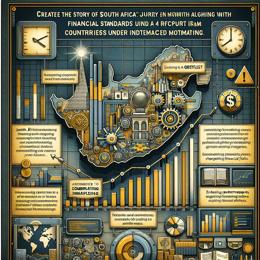Image created by AI
FSCA Acts Against Alleged Financial Scams by Banxso and AfriMarkets
In a decisive move to protect investors, the Financial Services Conduct Authority (FSCA) of South Africa is investigating alleged financial scams involving companies Banxso and AfriMarkets. The authority has frozen approximately 90 million rand and provisionally withdrawn the financial licenses of the entities in question.
The crux of the FSCA's concerns lies in the deceptive tactics purportedly used by these companies, including 'deep fake' ads featuring public figures known for their wealth and success to attract unsuspecting investors with promises of similarly high returns. Gerhard van Deventer, the Divisional Executive for Enforcement at the FSCA, emphasized the importance of public education to help prevent individuals from falling victim to such deceptive practices during his conversation with Alec Hogg on the BizNews Briefing.
The investigation was initiated following reports that Immediate Matrix, a media company, had been running misleading ads resulting in prospective clients being directed to Banxso. The FSCA's proactive response involved not only freezing Banxso's assets but also temporarily revoking its license as investigations continued. The Financial Intelligence Centre played a pivotal role in the preservation order on the accounts, displaying the cooperative efforts of South African financial enforcement bodies.
Another layer of this complex issue reveals a new company, AfriMarkets, sharing a chief operating officer with Banxso, suggesting potential replication of business models. Despite AfriMarkets holding a separate FSCA license, the authority is keenly monitoring the company for any signs of irregular activity.
Highlighting the misuse of respected figures, including the prominent cricketer Hashim Amla to allure investors, is indicative of the depth of deceptive marketing tactics employed by these organizations. The whistleblower's revelation underscores the predicament of financially vulnerable populations being exploited through unethical advertising.
A commitment to ethical sales and advice standards, with the clients' suitability at the forefront, was stressed by Van Deventer, underlining the FSCA's stance on the role of licensed financial service providers. He candidly discussed the implications of unsuitable clients, like retirees or those with modest income, being encouraged to invest in high-risk vehicles such as contracts for difference (CFDs) or other speculative products. Given their complexity and inherent risks, such investments are recommended only for those with substantial investment knowledge and experience.
Van Deventer highlighted the predatory nature of certain schemes, where victims are coerced into investing more funds after initial losses, often exacerbating their financial detriment. The FSCA's stance is clear: employing high-pressure sale tactics will result in the revocation of a financial service provider's license.
The FSCA's drive towards consumer education goes beyond mere enforcement as it invests in substantial public outreach, aiming to sensitize the populace to the risks associated with too-good-to-be-true financial opportunities.
Consumers are encouraged to remain vigilant, stay informed about regulatory actions, and use official FSCA channels to confirm the authenticity of financial service providers. Through these measures, the FSCA remains steadfast in its mission to uphold public trust in South Africa's financial markets.





